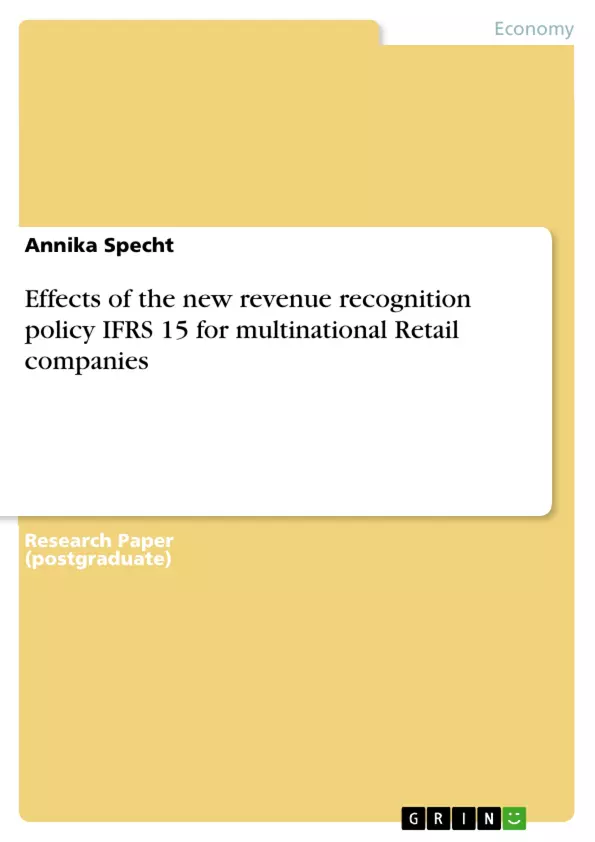The International Financial Reporting Standard 15 (IFRS 15) - Revenue from Contracts with Customers, announced in May 2014 by the International Accounting Standards Board (IASB) and Financial Accounting Standards Board (FASB), has widely changed the way how companies recognise, measure and disclose revenues. This article investigates the question of whether the objectives to eliminate inconsistencies, improve comparability and increase revenue levels were achieved in practice.
The aim is to synthesize previous research on the various effects of the IFRS 15 implementation, specifically the accounting and information effects, and provide empirical evidence for the impact on financial statements. As available literature has identified the effects for the Retail sector only superficially without any quantification, this article aims to bridge current knowledge gaps by focusing on Retail companies.
To carry out this research, the author has selected four multinational Retail companies to review qualitative and quantitative information on the IFRS 15 implementation from their annual reports to determine possible accounting and information effects.
Results show that IFRS 15 had no significant but slightly positive impact on the financial figures of the selected companies, leading to the conclusion that the persued goal to improve revenue levels turned effective in the Retail sector.
Inhaltsverzeichnis (Table of Contents)
- Introduction
- Literature Review
- Purpose of IFRS 15 and changes versus previous standards
- Accounting effects of IFRS 15
- Information effects of IFRS 15
- Capital Market effects and Real effects of IFRS 15
- Limitations and knowledge gaps
- Methodology
- Sample
- Data Collection Methods
- Variables
- Analysis
- Impact on Retained Earnings
- Impact on Revenue
- Evaluation of Findings
- Conclusion
- Appendix
- Abbreviations
- References
Zielsetzung und Themenschwerpunkte (Objectives and Key Themes)
The aim of this article is to analyze the impact of the new International Financial Reporting Standard 15 (IFRS 15) on the accounting and information effects of multinational retail companies. It aims to investigate whether the objectives of eliminating inconsistencies, improving comparability, and increasing revenue levels were achieved in practice.
- The impact of IFRS 15 on the accounting and information effects of multinational retail companies.
- The achievement of IFRS 15's objectives in practice, including eliminating inconsistencies, improving comparability, and increasing revenue levels.
- The analysis of quantitative and qualitative information from annual reports of selected multinational retail companies to assess the impact of IFRS 15 on their financial statements.
- An exploration of the accounting and information effects of IFRS 15 in the retail sector, addressing knowledge gaps in existing literature.
- The potential impact of IFRS 15 on different industries and businesses, considering factors like bundled products, rights of return, warranties, customer loyalty programs, and long-term contracts.
Zusammenfassung der Kapitel (Chapter Summaries)
The introduction highlights the importance of revenue figures for investors and the concerns surrounding revenue and earnings management. It introduces IFRS 15 as a standard aimed at harmonizing revenue recognition practices across industries and capital markets. The literature review explores the purpose and changes introduced by IFRS 15 compared to previous standards. It discusses the potential accounting effects of IFRS 15 and the impact on different industries. The methodology chapter describes the research approach, including the sample selection, data collection methods, and analysis techniques. It outlines the focus on analyzing the impact of IFRS 15 on retained earnings and revenue.
Schlüsselwörter (Keywords)
This research focuses on the impact of IFRS 15 on revenue recognition, accounting effects, and information effects in the retail sector. It investigates the implementation of IFRS 15 in multinational retail companies and its impact on their financial statements. Key themes include the harmonization of revenue recognition practices, eliminating inconsistencies, improving comparability, and increasing revenue levels.
- Quote paper
- Annika Specht (Author), 2021, Effects of the new revenue recognition policy IFRS 15 for multinational Retail companies, Munich, GRIN Verlag, https://www.grin.com/document/1223198



